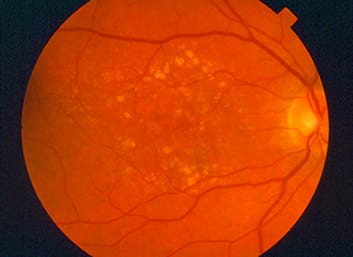Macular Degeneration (AMD) Treatment In Everett, WA
What is Macular Degeneration?
Macular degeneration, also known as age-related macular degeneration (AMD), is a common condition in older adults and the leading cause of vision loss in people age 50 and older. Macular degeneration affects the macula, the part of the retina responsible for the crisp, detailed central vision needed for reading or driving. Luckily, Physicians Eye Clinic can help. If you suffer from macular degeneration in Everett WA and surrounding areas, call today to schedule an appointment.
Types of Macular Degeneration

In only about 10 percent of patients does the condition progress to the more advanced form of the disease. If this occurs and the patient develops wet macular degeneration, new abnormal blood vessels develop beneath the macula, causing a leakage of blood and fluid. This leakage can lead to the creation of blind spots and permanent damage to central vision.
With either type, peripheral vision is maintained.
Risk Factors
As people age, everyone is at risk, but some people are at elevated risk due to genetic and/or environmental factors. Some individuals have a genetic variant known as complement factor H that makes them more likely to develop this condition. Nearly half of the cases of blindness associated with macular degeneration are linked to this genetic deficiency.
Macular degeneration is most common in females and people with light skin or eye color, and the risk for all patients increases as they age. Over 30 percent of adults age 75 and older have been diagnosed with advanced or intermediate age-related macular degeneration.
Other factors that may increase the risk of developing this condition include:
- Obesity
- Smoking
- High fat diet
- Elevated cholesterol levels
- Prolonged sun exposure
- High blood pressure
- Certain medications
What People Say About Us!
“I am very pleased with all of the services. The personnel at Physicians Eye Clinic are very well versed in giving instructions and explaining what is to be experienced at every step so that the patient can relax.” – Roger M, Mukilteo, WA.
Click here to read more reviews.
Prevention of Macular Degeneration
Patients can minimize their risk by exercising, eating a diet rich in Omega-3 fatty acids, and getting regular eye examinations. Contact Physicians Eye Clinic today to schedule an appointment or to learn more.
Symptoms
Patients with dry macular degeneration may notice gradual changes to their vision, including:
- Shadowy areas in the central vision
- Fuzzy and distorted vision
- Difficulty perceiving color
- Difficulty seeing fine details
- Blind spots in central vision

Progression of Symptoms
Macular degeneration may necessitate many lifestyle changes as it progresses. Patients may lose the ability to drive, have difficulty reading, and have difficulty recognizing faces. Because they retain peripheral vision, however, they usually remain capable of managing independently.
Diagnosis of Macular Degeneration
The ophthalmologist may be able to detect early signs through a regular eye examination while the patient is still asymptomatic. Any signs of this condition can be further confirmed by testing a patient’s central vision with an Amsler grid test. Treating it and other serious eye conditions as early as possible can help to prevent permanent loss of vision.
Macular Degeneration Treatment
While there is no cure for this disorder, there are several treatment options available to help patients manage this condition and preserve their vision. The best treatment option for each patient depends on the severity and type of the condition, as well as how much if any, permanent vision loss has occurred.
Intraocular Injections
Intraocular injections of vascular endothelial growth factor are often successful in stopping abnormal blood vessel growth in wet macular degeneration. The medications are injected into the vitreous of the eye on a monthly basis to control the damaging effects of wet macular degeneration. Photodynamic therapy is also effective in removing the newly developing abnormal blood vessels. Many patients also benefit from vitamin and mineral supplements, which help to clear out toxic substances that may build up.
It is essential for patients to seek continuous medical treatment to manage the condition and prevent permanent vision loss.

